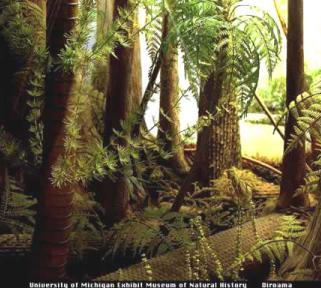
Ecosystem collapse might not have to spell the end for animal communities, according to a new study published in the journal Geology, reports Sarah Day.
Geoscientist online, 3 December 2010
The collapse of ecosystems such as rainforests is one of the feared outcomes for global climate change, particularly for the Amazon. But scientists from Royal Holloway, University of London and the University of Bristol have found evidence that, 300 million years ago, the effect of such a collapse was beneficial to the evolution of reptiles.
‘Climate change caused rainforests to fragment into small ‘islands’ of forest’ explains Dr Howard Falcon-Lang, one of the authors of the study. ‘This isolated populations of reptiles and each community evolved in separate directions, leading to an increase in diversity’.
A similar phenomenon was observed by Darwin on his trip to the Galapagos islands, where groups of animals evolved in isolated from their parent population.
‘This is a classic ecological response to habitat fragmentation’ says Professor Mike Benton from the University of Bristol, who co-authored the paper. ‘You see the same process happening today; it’s even been studied on traffic islands between major road systems’.
The scientists studied the fossil record of reptiles around an event in the Carboniferous, when rising temperatures and a drier climate caused devastation to the rainforests which covered much of Europe and North America. They found that, rather than suffering from the event, reptiles changed their diet as they adapted to the new climate and environment, becoming increasingly diverse.
‘It is fascinating that even in the face of devastating eco-system collapse, animals may continue to diversify through the creation of endemic populations’ says Sarda Sahney of the University of Bristol, who also co-authored the paper.
However, she warned that the conclusions of the study should not bring about complacency towards today’s rainforest ecosystems.
‘Life may not be so lucky again in the future, should the Amazon rainforest collapse’.
- Journal reference: S Sahney, M J Benton and H J Falcon-Lang, 'Rainforest collapse triggered Carboniferous tetrapod diversification in Euramerica', Geology, December 2010, v. 38, p. 1079-1082.